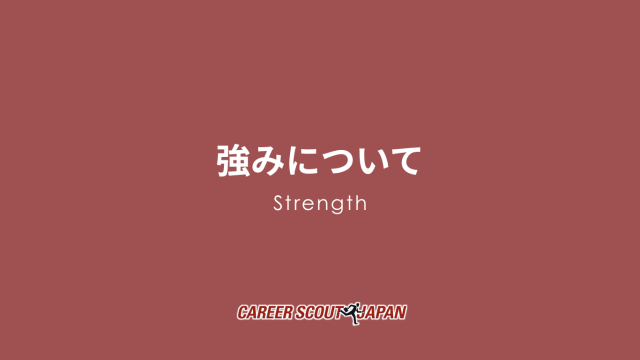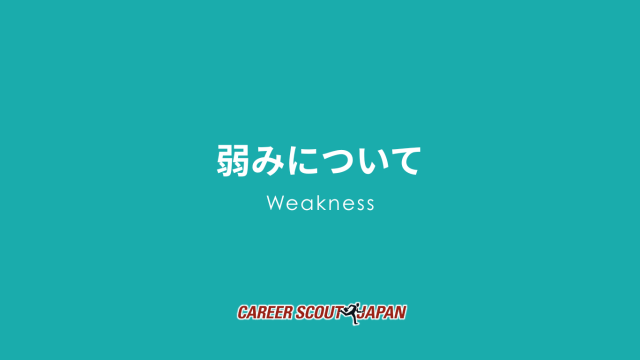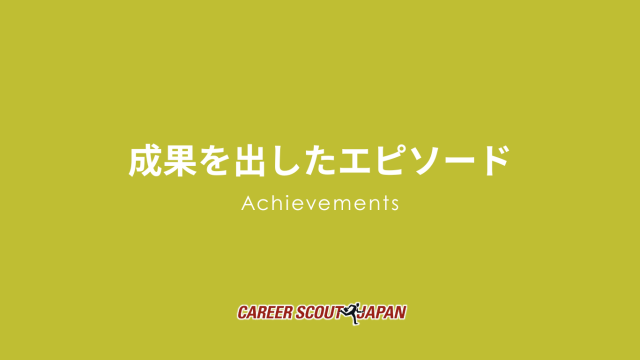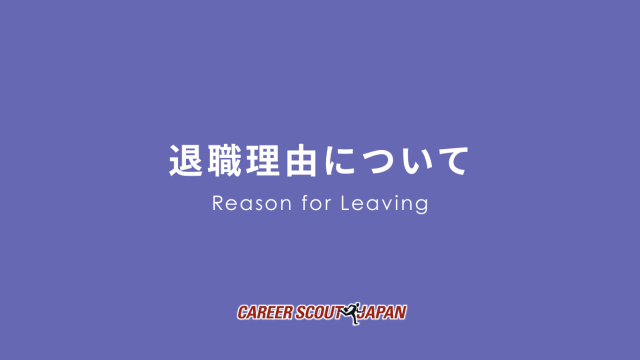【英語面接対策】外資系企業でよく聞かれる定番質問5選|強み・弱み・退職理由まで完全ガイド!
外資系企業へ転職する場合、英語面接は避けて通れません。特にキャリア採用の面接では、自己理解や実務経験を深掘りする質問が多く、準備不足では本来の力を発揮できないことも・・・。
本記事では、英語面接でほぼ必ずと言っていいほど聞かれる5つの質問を取り上げ、それぞれの質問の答え方のポイント、さらに英語の回答例をあわせてご紹介します。
目次
1. 強みについて(Strength)

質問例
What are your strengths?
(あなたの強みは何ですか?)
回答例
“One of my strengths is my ability to build and nurture strong, collaborative relationships with both internal and external stakeholders. In my previous role, I worked closely with global suppliers and local teams to streamline processes and improve coordination. By proactively identifying potential bottlenecks and addressing them early on, I helped improve our delivery timelines significantly.
As a result of these efforts, we were able to achieve a 20% increase in on-time shipments. This not only boosted our team’s efficiency but also strengthened our relationships with key stakeholders, ultimately contributing to the company’s overall success.”
(私の強みの一つは、社内外のステークホルダーとの強力で協力的な関係を築き、育んでいく能力です。前職では、海外のサプライヤーや現地チームと密接に連携し、プロセスの効率化と調整を進めました。潜在的な課題を早期に特定し、対策を講じることで、納期の改善に大きく貢献しました。その結果、オンタイムでの出荷が20%増加しました。この成果により、チームの効率が向上し、主要なステークホルダーとの関係も強化され、最終的には会社全体の成功に繋がりました。)
ポイント
-
応募しているポジションに合った強みを選ぶ
-
数値や成果を交えて、エピソードとセットで伝える
2. 弱みについて(Weaknesses)

質問例
What are your weaknesses?
(あなたの弱みは何ですか?)
回答例
“One area I’ve worked to improve is optimizing prioritization and resource allocation when supporting multiple departments and stakeholders. As an HR Business Partner, I’ve found that balancing immediate business needs with long-term HR initiatives can be challenging.
Earlier in my career, I sometimes focused too heavily on responding quickly to urgent requests from business leaders, which left limited time for driving strategic HR projects such as talent development or organizational planning. After receiving feedback from a senior manager, I began applying a more structured prioritization framework—evaluating both urgency and long-term impact. I also started aligning expectations with stakeholders early on, to ensure better clarity around timelines and deliverables.
Since making these changes, I’ve been able to maintain responsiveness while also contributing more effectively to broader HR strategies. This shift has strengthened my credibility with senior leadership and allowed me to add greater value as a strategic partner to the business.”
(これまでに意識的に改善してきた点の一つは、複数の部門やステークホルダーと関わる中での、業務の優先順位づけとリソース配分の最適化です。特に、事業部門のニーズに迅速に対応しながらも、人事全体の中長期的な戦略を推進するというバランスを取るのが課題でした。以前は、各部門からの依頼に応えようとするあまり、戦略的な人事施策の準備やレビューに十分な時間を取れないことがありました。マネージャーからのフィードバックを受けてからは、「緊急性」だけでなく「重要性」に基づいた優先順位づけを徹底し、関係者と早い段階で期待値や納期を調整するようにしています。その結果、日々の要望への対応力を維持しながらも、組織開発や人材育成などの中長期的なテーマにも安定して取り組めるようになり、経営陣との対話の中でも提案の質とタイミングに対して評価をいただけるようになりました。)
ポイント
-
客観的なフィードバックを活用する
- 改善のために取ったアクションを伝える
- どのように克服しているかを伝える
3. 成果を出したエピソード(Achievements)

質問例
Tell me about your greatest achievement in your previous job.
(これまでの業務で最も成果を出したエピソードを教えてください。)
回答例
“In my previous role as an HR Business Partner, I led a project to streamline the performance review process across three regional offices. The existing system was outdated and caused inconsistencies in how performance evaluations were conducted, leading to employee dissatisfaction and delayed feedback.
To resolve this, I collaborated with senior leadership and the HR team to design a new digital system for performance tracking and evaluations. I played a key role in selecting the appropriate platform, ensuring it met the needs of both management and employees. Additionally, I organized and delivered training sessions for all managers to ensure they understood the new process and how to provide constructive feedback effectively.
As a result, the time spent on performance reviews was reduced by 40%, and the accuracy of feedback improved significantly. Employees reported higher satisfaction with the process, and managers found it easier to track progress and set goals. This project not only improved HR operations but also helped foster a more transparent and productive work environment, contributing to better employee engagement across the company.”
(前職のHRビジネスパートナーとして、3つの拠点におけるパフォーマンス評価プロセスの効率化を図るプロジェクトを主導しました。従来のシステムは古く、パフォーマンス評価の実施方法に一貫性がなく、従業員の満足度低下やフィードバックの遅延を引き起こしていました。これを解決するために、経営陣やHRチームと連携して、新しいデジタルシステムを導入し、パフォーマンストラッキングと評価を一元化しました。私は適切なプラットフォームの選定を担当し、経営陣と従業員の両方のニーズに合ったシステムを選びました。また、すべてのマネージャーに対して新しいプロセスと効果的なフィードバックの提供方法を理解してもらうために、トレーニングセッションを企画・実施しました。その結果、パフォーマンスレビューにかかる時間は40%短縮され、フィードバックの精度が大幅に向上しました。従業員はプロセスに対して高い満足度を示し、マネージャーは進捗の追跡や目標設定が容易になりました。このプロジェクトは、HR業務の効率化にとどまらず、より透明で生産的な職場環境の構築にも寄与し、従業員のエンゲージメント向上に繋がりました。)
ポイント
-
結果だけでなく、背景やプロセスも説明する
-
数値や影響を示すと説得力アップ
4. 仕事で困難だった経験(Difficult situation at work)

質問例
Tell me about a difficult situation at work and how you handled it.
(仕事で困難だった経験と、それをどう乗り越えたかを教えてください)
回答例
“One of the most challenging experiences I faced in my previous role was during the busy season when our team was severely understaffed. The workload was overwhelming, and it became increasingly difficult to meet deadlines while maintaining the high quality of work we were known for.
To address this challenge, I took the initiative to propose a task prioritization system. I worked closely with my team to assess the urgency and importance of each task, and then reallocated responsibilities to ensure that critical tasks were completed first. I also streamlined communication between team members to ensure that everyone was clear on their responsibilities and deadlines.
As a result, we were able to meet all deadlines without compromising the quality of our work. The system I implemented proved to be effective, and it was later adopted permanently as part of our team’s workflow. This experience taught me the importance of adaptability, communication, and collaboration in overcoming difficult situations.”
(私が前職で経験した最も困難な出来事の一つは、繁忙期にチームが人手不足に陥ったことでした。仕事の量が非常に多く、納期を守りながら質の高い業務を維持することが次第に難しくなっていきました。この課題に対処するため、私はタスクの優先順位を明確にするシステムを提案しました。チームと密に連携し、各タスクの緊急度と重要度を評価した上で、重要なタスクを優先するように責任を再分配しました。また、チーム内のコミュニケーションを効率化し、各メンバーが自分の責任と納期を明確に理解できるようにしました。その結果、納期を守りつつ業務の質を保つことができました。私が導入したシステムは非常に効果的であったため、その後、チームの業務フローに恒久的に取り入れられることになりました。この経験を通じて、困難な状況を乗り越えるためには柔軟性、コミュニケーション、そして協力が重要であることを学びました。)
ポイント
-
状況(Situation)、課題(Task)、行動(Action)、結果(Result)の「STAR法」で説明する
-
自分の学びや成長も含めると好印象
5. 退職理由(Reason for Leaving)

質問例
Why did you decide to leave your job?
(退職理由を教えてください)
回答例
“I decided to leave my previous company because I wanted to embrace new challenges in a more international and dynamic environment. While I truly valued the experience and the opportunities I had there, I reached a point where I felt that my personal and professional growth could be better supported in a role with broader responsibilities.
In my previous role, I was able to gain a solid foundation and develop my skills, but I felt that I had reached a plateau in terms of growth opportunities. I am now eager to take on a position that will allow me to work in a more global context, where I can collaborate with diverse teams, solve complex problems, and contribute to the success of the organization on a larger scale. I believe this new direction will allow me to continue developing as a professional while bringing fresh perspectives and energy to a new team.”
(前職を退職した理由は、より国際的でダイナミックな環境で新しい挑戦をしたいと考えたからです。そこで得た経験や機会にはとても感謝していますが、自分の成長をさらに促進できるような、より広い責任を持つ役割に進む時期だと感じました。前職ではしっかりとした基盤を築き、スキルを磨くことができましたが、成長の機会については一定の限界を感じていました。今後は、もっと多様なバックグラウンドを持つチームと協力し、複雑な課題に挑戦できるような役割で、組織の成長に貢献したいと考えています。このような新しい環境で働くことが、自分自身の成長にもつながると確信していますし、さらに新しい視点とエネルギーをチームにもたらせると考えています。)
ポイント
-
ネガティブな表現や前職の批判は避ける
-
スキルアップやキャリアの方向性など、前向きな理由を伝える
まとめ
英語面接では、「何を話すか」だけでなく「どのように話すか」も重要です。
事前に定番の質問に対する回答を用意し、自分の経験に基づいて話せるように準備しておくことで、安心して本番に臨むことができます。
下記よりご登録いただくと、厳選された求人情報をお届けします!
▶面接対策に関するブログはコチラ
■キャリアスカウトジャパンについて
キャリアスカウトジャパン株式会社(CSJ)は、経理・財務、サプライチェーン・物流、人事の専門性に特化し、関東(東京・神奈川・埼玉・千葉他)に所在する幅広い業種の外資系優良中小企業へのハイレベルの人材紹介を行っています。
▼SNSで最新情報をチェック!▼

